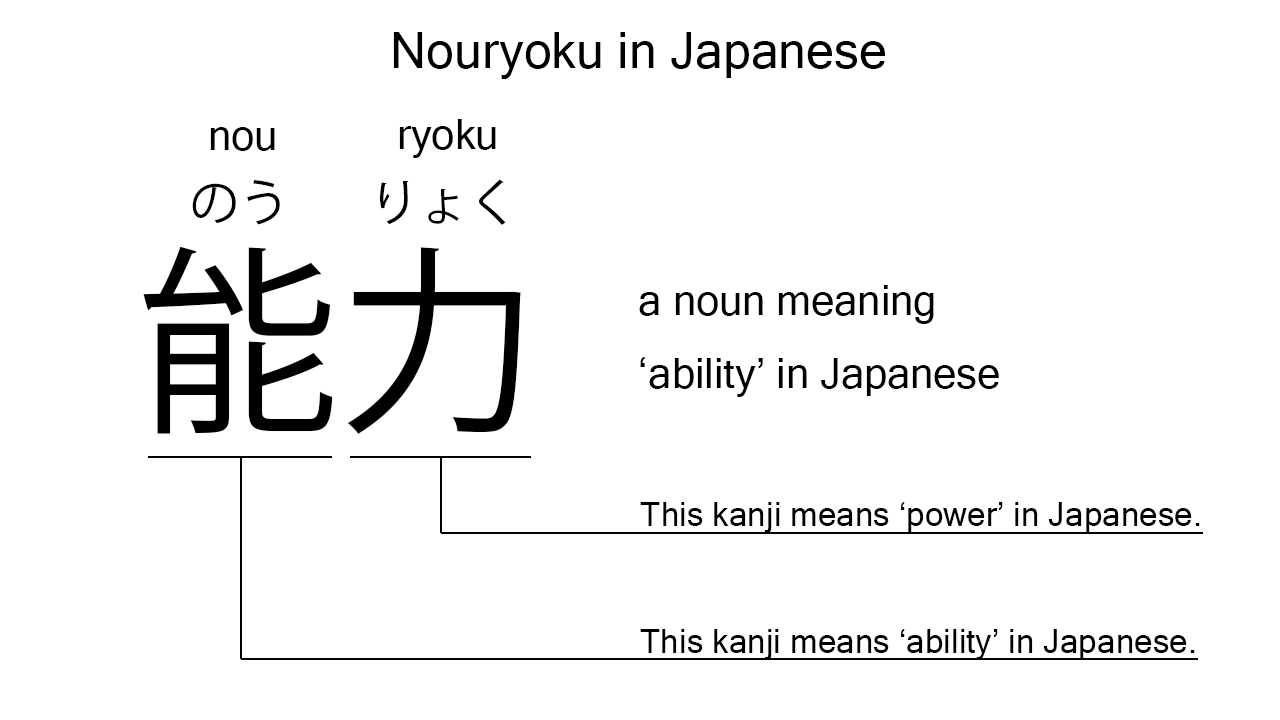What does “nouryoku” mean in Japanese?
Native speakers say “nouryoku” often to mean ‘ability’ in Japanese. Perhaps, some Japanese learners know this word as it is sometimes used in Japanese movies, novels, manga, anime, and the like. In this blog post, however, I will explain this word in detail based on its kanji expression. And also, I will explain how to use it through example sentences. My explanations would help Japanese learners understand “nouryoku” more clearly. Then, let’s get started!
Contents
Definition and meanings of “nouryoku”
Let me start with the definition and meanings of “nouryoku”.
- nouryoku – 能力 (のうりょく) : a noun meaning ‘ability’, ‘skill’, ‘talent’, or such in Japanese. This can also work as plural. Learn more about Japanese plural.
The definition and meanings are not that difficult, I think. The meanings seem to be based on the same concept. To understand this noun more clearly, however, let me explain its kanji characters in detail, one by one.
What does “nouryoku” literally mean in Japanese?
The kanji expression of “nouryoku” consists of the following two kanji characters:
- 能 : a kanji character often used to mean ‘ability’ in Japanese.
- 力 : a kanji character often used to mean ‘power’ in Japanese.
From these two kanji characters, we can understand that the formed noun literally means an ‘ability and power’ in Japanese. This literal interpretation is very close to the actual meanings, I think.

When we meet new kanji expressions, we should check their kanji characters in detail to understand their meanings clearly and deeply. In many cases, kanji characters tell us a lot about the meanings of the expressions they form. Actually, here, we could get the better understanding of “nouryoku” through the detailed kanji check above.
So far, I’ve explained the definition and meanings of “nouryoku” together with its kanji characters. Then, let me explain how to use it through the example sentences below.
Example #1: how to say “abilities” in Japanese
kanojo tachi no nouryoku wa subarashii – 彼女達の能力は素晴らしい (かのじょたちののうりょくはすばらしい)
Their abilities are amazing.
Below are the new words used in the example sentence.
- kanojo – 彼女 (かのじょ) : a pronoun meaning ‘she’ in Japanese.
- tachi – 達 (たち) : a suffix used after a noun or pronoun to make its plural form. In the example, this is used after “kanojo” to make its plural form, “kanojo tachi”, which means ‘they’ in Japanese.
- no – の : a case particle used after a noun or pronoun to make its possessive case. In the example, this is used after “kanojo tachi” to make its possessive case, “kanojo tachi no”, which means ‘their’ in Japanese.
- wa – は : a binding particle working as a case marker or topic marker. In the example, this works after “kanojo tachi no nouryoku” to make the subject in the sentence.
- subarashii – 素晴らしい (すばらしい) : an i-adjective meaning ‘amazing’ or such in Japanese.
This is a typical usage of “nouryoku”. In this example, it works together with the possessive case, “kanojo tachi no”, to mean ‘their abilities’ in Japanese.
Example #2: another usage of “nouryoku”
boku wa shuuchuu suru nouryoku ga hoshii desu – 僕は集中する能力が欲しいです (ぼくはしゅうちゅうするのうりょくがほしいです)
I want an ability to concentrate.
Below are the new words used in the example sentence.
- boku – 僕 (ぼく) : a pronoun meaning ‘I’ in Japanese. This is used mainly by boys and young males.
- shuuchuu suru – 集中する (しゅうちゅうする) : a verb meaning ‘to concentrate’ or such in Japanese. In the example, this works in front of “nouryoku” to mean an ‘ability to concentrate’ in Japanese.
- ga – が : a case particle used to make the subject word or the object word in a sentence. In the example, this is used after “shuuchuu suru nouryoku” to make the object in the sentence.
- hoshii – 欲しい (ほしい) : an i-adjective, but often translated into English as ‘to want’. This is widely used to describe a feeling of wanting something.
- desu – です : an auxiliary verb used after a noun or adjective to make it polite. Probably, this is well known as a part of Japanese desu form. In the example, this is used after “hoshii” to make it sound polite.
This is another typical usage of “nouryoku”. In this example, it works together with the verb, “shuuchuu suru”, to mean an ‘ability to concentrate’ in Japanese. When we want to mean an ‘ability’ or ‘abilities’ in Japanese, anyway, this noun is always a good option.
Summary
In this blog post, I’ve explained the definition and meanings of “nouryoku” in detail based on its kanji expression. And also, I’ve explained how to use it through the example sentences. Let me summarize them as follows.
- nouryoku – 能力 (のうりょく) : a noun meaning ‘ability’, ‘skill’, ‘talent’, or such in Japanese. This can also work as plural. These two kanji characters literally mean an ‘ability and power’ in Japanese. This literal interpretation is very close to the actual meanings, I think.
Hope my explanations are understandable and helpful for Japanese learners.
Leave a Reply